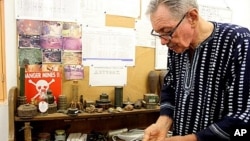An organization dedicated to the removal of land mines from three conflicts in the small West African nation of Guinea-Bissau says the country will become mine free in 2012.
The land mine removal group HUMAID says it is close to completing its work in the mine-riddled countryside of Guinea-Bissau, a country of 1.6 million people that is nestled between Senegal and Guinea-Conakry.
Former U.S. ambassador to Guinea-Bissau, John Blacken, has led the organization for the last decade. He says he is hopeful it will have removed most of the anti-personnel and anti-tank mines still scattered in the north and south by the middle of next year.
More than 1,200 people have been victims of mines in Guinea-Bissau. These mines are left over from three conflicts, including the War of Liberation in the 1970s, the country's civil war in the late 90s and the Casamance rebellion in 2006.
HUMAID's priority was the capital city of Bissau, which had been turned into a war zone during the civil war in 1998 and 1999. Thousands of civilians had fled the violence and upon returning to the city, unknowingly encountered mines that had been planted on the outskirts of Bissau, the front line of the conflict.
Blacken says he felt compelled to help this country, which he has lived in almost continuously since retiring from the foreign service in the late 80s.
“I said, 'Well, we've got no money, but if we don't start doing something, we're never going to get money.' So what we did, the eight of us, I had a pick-up truck - the eight of us started picking up the unexploded ordinances that were here at the center of the city,” he said.
Eventually Blacken got the funding he needed to buy more equipment and get manpower and says, since then, his organization has more or less had enough financial backing from international donors. Bissau was declared mine-free in 2006.
Most of Blacken's team are former soldiers who have been retrained in humanitarian de-mining. It is a dangerous and painstaking process that involves setting up a perimeter based on mine detection and interviews with locals. Personnel then partition the area and work in one meter wide blocks at a time, sticking rods into the ground at angles to try and find explosives.
HUMAID has cleared 3,571 mines as of 2010, and remarkably, has never had an accident.
HUMAID, a non-governmental organization, is currently working on mine fields from the Liberation War with Portugal. Guinea-Bissau declared its independence from the Portuguese in 1974.
Blacken says when his team began working in the area, local villagers said they had avoided accidents by completely bypassing the tracts of land adjacent to their houses.
“What is amazing to me was how they could keep their kids from running out there because when we were clearing it, there were mines within 50 meters of the houses. How you keep kids from running out there I never knew, but they apparently did. Or maybe the children are just too light to set them off,” he said.
Among the most common victims in Guinea-Bissau are cows and other livestock, which stumble across mines while grazing in fields. Blacken says as long as the explosive is good, the mine will stay active for decades, growing more fragile over time.
Blacken says it is difficult but fulfilling work.
“There is a lot of satisfaction in what we're doing, for them as well as for me. The satisfaction is every time you take a mine out of the ground, there's a threat gone to somebody's life,” he said.
It's not many NGOs that can say they've been put out of business after accomplishing their mandate, and Blacken says he is very proud of what he and his team have done.










